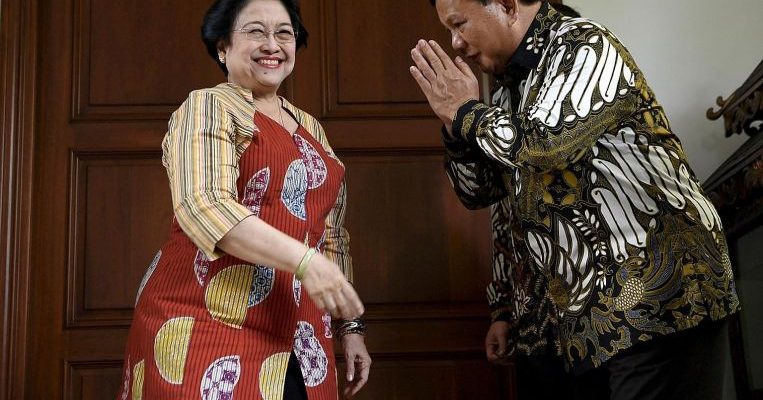
Leaders of Indonesia’s main political parties held two closely watched meetings last week, as they jostled for possible leadership positions in the incoming administration of President Joko Widodo.
The head of Indonesia’s opposition party Gerindra, Mr Prabowo Subianto, met Ms Megawati Sukarnoputri, chief of ruling party Indonesian Democratic Party of Struggle (PDI-P), last Wednesday – two weeks after Mr Prabowo met Mr Joko.
The meetings, with Mr Joko and with Ms Megawati, set tongues wagging that Mr Prabowo is seeking support to have Gerindra leaders appointed as Speaker of the prestigious People’s Consultative Assembly (MPR) and several ministerial posts in the Indonesian Cabinet.
On the flip side, the regular buzz that Gerindra and Mr Prabowo are lobbying for top posts in Mr Joko’s coalition appeared to have unsettled several political parties allied to the Indonesian President.
Leaders of four of the PDI-P’s main allies – the National Democratic Party (NasDem), Golkar, National Awakening Party (PKB) and United Development Party (PPP) – met on Monday, raising whispers that they are unhappy with the push by Mr Prabowo.
These allies bitterly fought against Mr Prabowo and Gerindra in the months leading to the April presidential and legislative elections won by Mr Joko, and are eyeing some of the top posts for their own parties.
-
Different legislative roles
-
PEOPLE’S REPRESENTATIVE COUNCIL (DPR)
The DPR is vested with the most legislative power, including making new laws and approving government-proposed annual budgets. It has 575 MPs who are elected every five years.
The lawmakers form committees in charge of different sectors, from defence to social affairs. These are de facto counterparts to the ministries in the executive branch, which they supervise.
The House is led by a Speaker and four Deputy Speakers.
REGIONAL REPRESENTATIVE COUNCIL (DPD)
Members of the DPD represent Indonesia’s 34 provinces, with each province given four seats. Sometimes referred to as the Senate, it has 136 elected representatives.
Its members normally are not affiliated with any political party, and are usually prominent figures in their home provinces.
The DPD has much less power than the DPR, confined mostly to tackling issues regarding regional autonomies, and national-provincial government relations.
The Senate is led by a Speaker and two Deputy Speakers.
PEOPLE’S CONSULTATIVE ASSEMBLY (MPR)
When the DPR and DPD convene, the combined body is called the MPR. It is the only council with powers to amend the country’s Constitution and impeach the president, but under very strict and complicated procedures involving the Constitutional Court.
The MPR is led by a Speaker and four Deputy Speakers.
There has also been constant speculation that two other parties that are not in Mr Joko’s coalition, the Democratic Party led by former president Susilo Bambang Yudhoyono and the National Mandate Party (PAN), might also join the fold soon.
The jockeying for positions is expected to continue over the next three months until Mr Joko is officially sworn in as president on Oct 20, but analysts contacted by The Sunday Times said Mr Joko should be able to navigate through the current jostling unscathed.
Mr Mada Sukmajati, a political science lecturer at the Gadjah Mada University in Yogyakarta, said the re-elected President has good political capital this time around as he has done well in the past five years.
“For this second term, Jokowi is more confident and has greater bargaining position in fending off pressures from his party PDI-P. He has adequate backing from other political parties,” Mr Mada told The Sunday Times, adding quickly that it does not mean Mr Joko could reject all requests made by PDI-P.
While Mr Joko is a leader in the PDI-P, ultimate power in the nationalist party sits with Ms Megawati, a former Indonesian president and daughter of the country’s founding president Sukarno.
Mr Joko will need solid backing from the 575-seat People’s Representative Council (DPR), or Parliament, to push through bureaucratic reforms, boost investments and accelerate business-permit processes as he has promised.
A weak backing from his allies would slow down the administration’s agenda.
The leaders of the four allied parties who met last Monday said they remain united behind the ruling coalition, but sent a clear message to Mr Prabowo’s Gerindra.
“At the moment, the coalition is very solid, strong and sound. If a new party comes in, it must add solidity, increase strength and increase the health of the coalition,” NasDem secretary-general Johnny G. Plate said last Thursday.
Golkar chairman Airlangga Hartarto said there was no split in the Joko-led alliance but that first priority for posts must be given to existing allies.
He said: “We prioritise coalition members. All members of the coalition should be accommodated.”
Mr Firman Manan, a political analyst from Padjadjaran University in West Java, told The Sunday Times that it would be difficult for Mr Joko to meet every party leader’s wishes, but he would certainly make everyone relatively happy, and keep the coalition together.
“There would be dynamics, but I don’t see a scenario where any political party backing him now leaves the coalition later,” Mr Firman said.
